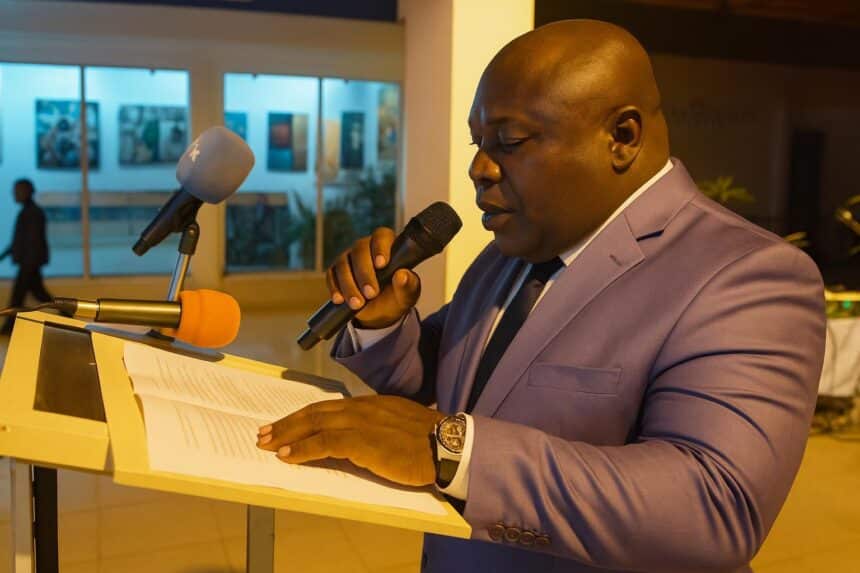Opening Night Draws a Packed House
The lights dimmed, the projector whirred, and a ripple of anticipation swept through the Cercle Africain museum in Pointe-Noire as cinema made its long-awaited comeback on 3 October 2025. The venue, dormant for years, reopened under an elegant African-Italian banner celebrating shared artistic passion with residents eagerly watching.
Representatives of the Ministry of Cultural, Tourism, Artistic and Leisure Industries joined forces with Italy’s ambassador, Enrico Nunziata, local officials, Eni Congo executives and curious residents. Their presence offered both political weight and friendly warmth, signaling official confidence in a space conceived as Pointe-Noire’s living room for creativity.
Two Stories, One Emotional Bridge
The inaugural double bill paired Federico Bondi’s acclaimed Italian drama Dafne with the home-grown thriller Grave Erreur 2 by Congolese director Richie Mbebelé. Though stylistically distinct, both films share intimacy: a daughter guiding her grieving father, and former friends confronting betrayal’s heavy cost that resonates deeply with audiences across cultures and generations alike.
Applause erupted after each screening, yet comments in the foyer revolved around similarities rather than contrasts. Viewers praised Mbebelé’s suspenseful pacing and noted, almost with surprise, that technical differences between the two productions felt minimal, a testament to the resilience of Congolese filmmakers working with limited resources today.
Ambassador Nunziata voiced that impression onstage, affirming, quote, Between the two films, the difference was barely noticeable; the Congolese picture held us from first frame to last. His words landed like a benediction on the local crew and hinted at future Italian support via the renewed Mattei Plan framework.
Friday Nights Set to Shine Weekly
Organisers have already locked a simple, memorable rhythm: every Friday night the museum becomes a little cinema, offering residents family-friendly access to international and Congolese titles. Tickets remain symbolic, removing cost as a barrier and persuading teenagers, parents and elders to gather under the same flickering ceiling weekly.
That programming choice answers a recommendation from the minister’s cabinet: transform culture into a regular habit, not a rare occasion. By institutionalising a predictable slot, Cercle Africain hopes to nurture a new generation of cinephiles while amplifying the city’s nighttime economy through snack vendors and moto-taxi rides homeward.
Museum director Clarisse Nkodia underlines another motive: archiving contemporary Congolese life. Each screening is documented for educational purposes, creating a living repository for schools and researchers. When pupils walk through the permanent exhibitions on Pointe-Noire’s colonial past, they can now also witness how today’s stories reach the screen there.
Italian-Congolese Partnership Gains Momentum
Behind the projector, diplomacy hums. The screenings form part of Italy’s broader cultural diplomacy toolkit, aligning with Rome’s Mattei Plan that encourages mutual growth with African nations through energy, infrastructure and, crucially, culture. For Congo-Brazzaville, the partnership complements internal efforts to diversify its creative economy and youth employment.
Energy major Eni Congo quietly finances logistics, drawing on its long presence offshore. Communication officer Carine Massamba explains that investing in storytelling strengthens community relations: People see us drilling, but they rarely hear our human side; cinema lets us sit together and appreciate the dreams we all share in peace.
Local entrepreneurs are equally upbeat. Designer stalls in the courtyard now sell handmade totes featuring stills from classic Congolese films, while cafés extend hours to catch post-show crowds. City councillor Arnaud Makosso predicts a virtuous loop: stronger footfall convinces investors to refurbish surrounding streets, upgrading lighting and security soon.
An Invitation to Own the Screen
Throughout the ceremony, Lys Pascal Moussodji’s representative repeated a gentle challenge: The museum will only thrive if citizens claim it. His call resonates with a wider national agenda promoting cultural pride alongside economic stability. By turning spectators into regular participants, the ministry hopes to cement social cohesion across generations in the city.
Filmmaker Mbebelé, still basking in applause, embraced that mission. He promised workshops for aspiring directors using nothing but smartphones and free editing software. We cannot wait for Hollywood budgets, he laughed; talent is cheaper than equipment. His optimism drew cheers from students clutching notebooks at the auditorium’s edge.
Pointe-Noire mayor Charlotte Frango, meanwhile, sees the screenings as soft power. She envisions touring versions in suburban community halls and fishing villages along the coast. If successful, the model could feed the capital Brazzaville with fresh provincial voices, reversing the usual cultural flow within the Republic of Congo itself.
For now, the key metric will be attendance. A simple notebook at the ticket table records demographics, and early figures show encouraging diversity: oil-platform technicians next to high-school poets, expatriate engineers chatting with market vendors. Such mixing, organisers argue, is the very definition of successful public service here.
As the exit lights flickered out on that first revitalised evening, chatter drifted toward the esplanade: plans for next week’s screening, suggestions for popcorn flavours, whispers about auditions. More than reopened doors, the Cercle Africain seems to have reopened imagination, letting Pointe-Noire dream collectively, frame by frame again.





















